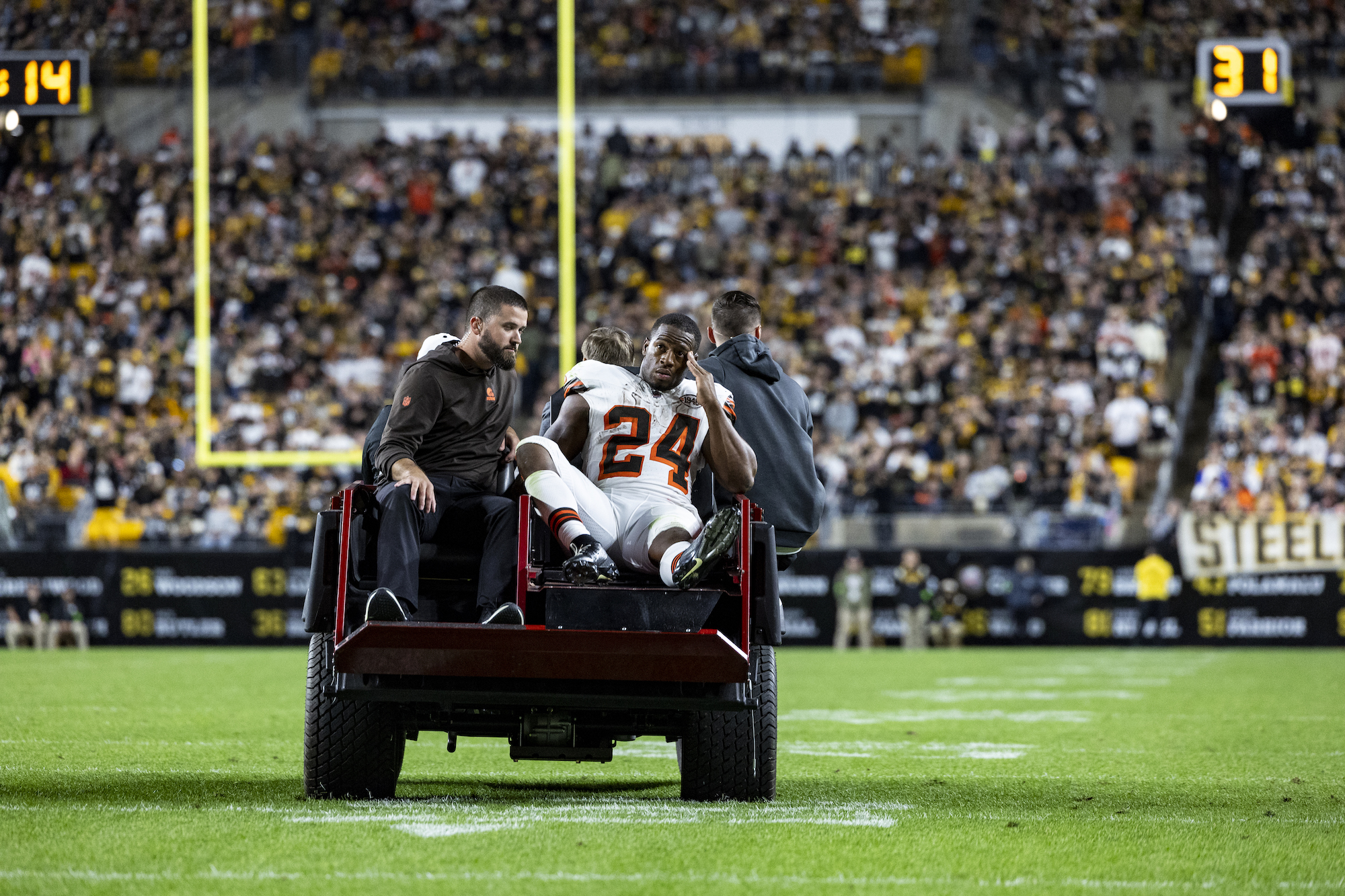Nick Chubb likely has somewhere between two and four fewer intact ligaments than he did this time yesterday, after a tackle bent his a knee in a direction knees were never meant to bend. It was gross. The Browns, even before running an MRI, are ruling him out for the season. It could be even worse than that for Chubb. This is the second time he has shredded that knee, and he'll turn 28 in December—elderly in running back terms—and his contract, which ostensibly runs through 2024, is structured to make it fully painless for the Browns to cut him this offseason. There will be younger, cheaper backs, without injury histories, available to any team looking for a body in the backfield. Chubb's career might have effectively ended on Monday night; just as a function of age, he'll certainly never receive another significant payday.
Which made Monday a fascinating day for it to come out that the NFL claimed that running backs were faking injuries and failing to honor their contracts.
The league filed a grievance last week against the Players Association, alleging in its memo to owners that,
“Beginning this past summer and continuing throughout Training Camp, NFL Players Association leadership, including President JC Tretter, have become increasingly vocal in advising NFL Players dissatisfied with their current contracts to consider feigning or exaggerating injuries to withhold service as a way to increase their leverage in contract negotiations."
WaPo
The drama dates to offseason tension between Josh Jacobs and the Raiders, Saquon Barkley and the Giants, and Jonathan Taylor and the Colts. All were seeking long-term contracts; none got them. Jacobs signed a one-year deal, Barkley signed his franchise tender, and Taylor, recovering from offseason ankle surgery, did not reach an agreement and was placed on the physically unable to perform list.
The league alleges that the advice to feign injury was given on a Zoom call in July in which a handful of running backs discussed the sorry state of the running back market, and what they could do about it. Chubb, one of the very few backs on a multiyear deal, was on that call. He said he understood that his situation could change at any moment.
"I’ve got another year [under contract], so it’s easy for me to say it’s not a big deal, but next year it could be me," Chubb said. "I’m here for my team, but I’m also understanding the situation I could be in," he added.
The fortunes of an NFL running back can change in an instant. J.K. Dobbins tore his Achilles tendon and is out for the year; in the last year of his rookie deal, he was supposed to be playing for a contract this year. Aaron Jones, who agreed to a reduced contract this year, is out with a hamstring injury suffered in Week 1. Barkley will miss several games with an ankle sprain. Jeff Wilson started the season on IR. Chase Edmonds has an MCL strain and will go on IR. Boston Scott is in the concussion protocol. David Montgomery was carted off with a thigh injury on Sunday. Jamaal Williams left Monday's game with a hamstring injury.
Running the ball is a brutal business. No other position carries the ball as often, or gets tackled nearly so many times. You couldn't intentionally design a better way for a guy to get injured. It logically follows that you couldn't design a position less likely for owners to want to commit long-term contracts to. So, as a rule, they don't. The job of a running back, and his union, is to get as much guaranteed money as possible in the deals they do sign.
Chubb has gotten most of his already, which makes him suddenly disposable. While still technically under contract for next season, the Browns can cut him this winter and be on the hook for just $4 million in dead cap—a pittance to get out from under a guy with a veteran contract coming off major surgery and hand the starting running back job to someone on a rookie deal.
So what if running backs are overplaying their very real injuries in training camp while trying to get a new deal, in order to skip practices without being fined? A hold-out—or in this case, a hold-in—is literally the only leverage they have in negotiations. They have the one weapon, while their bosses have many, and I will never fault them if they use it. In the NFL's grievance, they accuse the union of failing "to see that the terms and conditions of all NFL Player Contracts are carried out in full by players." This is a laughable contention in a league where contracts are torn up by the dozen when a team decides it doesn't want to honor them anymore. Things change fast; running backs, get your money how and while you can.






